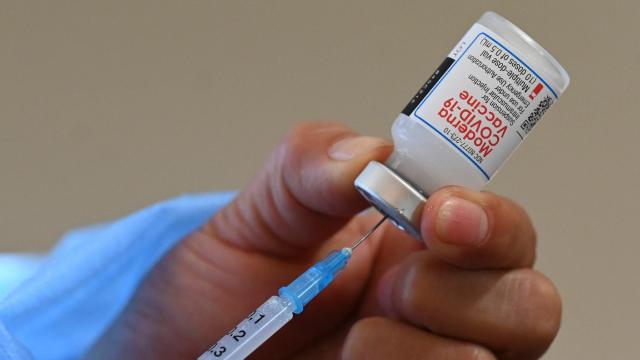Perhaps the next best hope for a permanent way to defeat HIV is about to get underway. According to trial registration data, pharmaceutical company Moderna will start a Phase I clinical trial of its HIV vaccine candidate this week, based on the same mRNA platform behind its successful covid-19 vaccine. The trial will test the vaccine’s safety and measure the relevant immune response generated in a small group of healthy volunteers.
Moderna announced its latest efforts to develop an HIV vaccine in April, as part of a collaboration with the International AIDS Vaccine Initiative (IAVI) and the Bill and Melinda Gates Foundation. At the time, the company discussed plans to test two potential candidates, named mRNA-1644 and mRNA-1574. On August 11, Moderna and other research partners published details about their Phase I trial of mRNA-1644 on ClinicalTrials.gov, a database of human trials maintained by the National Institutes of Health. According to the posting, the trial will officially start on August 19. Ultimately, it plans to involve 56 healthy volunteers who test negative for HIV.
There are now highly effective antivirals that can eradicate most traces of HIV in infected people, as well as prevent people exposed to it from becoming infected. But the virus still has plenty of tricks that let it linger in the body once it has infected our cells. This includes the ability to quickly mutate parts of its structure, making it hard for HIV-specific antibodies produced by the immune system (elicited either through infection or a theoretical vaccine) to recognise it. For decades, though, we’ve known that some people can produce broadly neutralising antibodies to HIV — antibodies that can target multiple strains of the virus. These antibodies focus on stable parts of the virus that don’t change much as it mutates, allowing them to remain potent.
One common strategy for developing an HIV vaccine has relied on coaxing the immune system to produce these broadly neutralising antibodies on its own, much as some genetically blessed people can do already. But so far, these efforts have fallen short. Moderna is betting that its vaccine platform, combined with a novel method for soliciting these powerful antibodies from the immune system, can succeed where others have failed.
Phase I trials are expressly designed only to test the safety of a new drug or vaccine in healthy people. But the researchers will also be keeping an eye on the immune responses of the volunteers, particularly their B-cells, which are responsible for producing and maintaining antibodies. That should tell us whether this plan shows signs of being feasible.
mRNA vaccines work by encoding the relevant target into a package of genetic material (the mRNA) that gets delivered to cells. The cells then produce the target on their own, hopefully triggering the desired immune response. Contrary to anti-vaccination propaganda, the mRNA itself quickly dissolves and at no point alters our genetics. Ideally, as seen with the covid-19 shot, this development process takes less time than traditional vaccines, which Moderna hopes will allow scientists to quickly fine-tune the best antigens (the parts of the virus that actually create an immune response) to use for an HIV inoculation.
The company has said that it plans to start three clinical trials of HIV vaccine candidates in 2021. At this time, Moderna has not responded to a request for comment from Gizmodo concerning this trial or the ongoing status of research into the mRNA-1574 candidate.
Even in the best-case scenario, it’s likely to take years before any successful HIV vaccine can reach the public. Moderna’s current Phase I study isn’t expected to finish until 2023, and prior to the covid-19 vaccines, the shortest gap between human trials and full approval for a vaccine was five years. During the covid-19 vaccine trials, the coronavirus was spreading widely around the world, allowing faster data gathering for how well the shot protected people.
HIV is much less common, so gathering the needed data to confirm a vaccine works will take longer. (For ethical reasons, of course, researchers do not usually deliberately expose people to pathogens.) Given fears that the pandemic will only further set back public health efforts to eradicate HIV, though, these vaccines will still be sorely needed for years to come.
